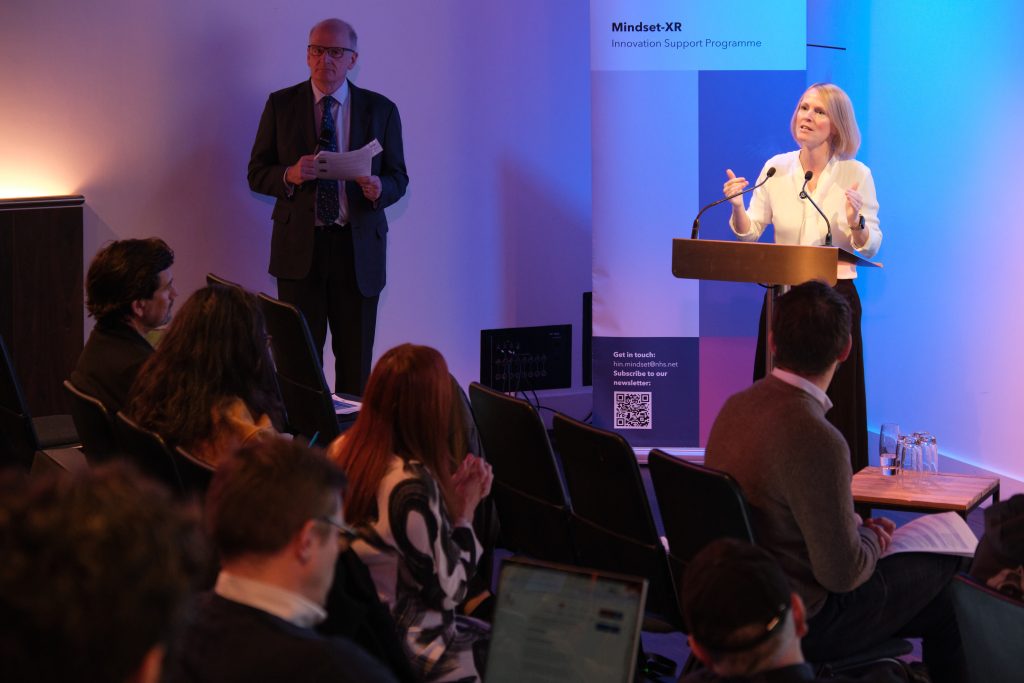A call to innovators from NHS England’s National Clinical Director for Adult Mental Health
November 12, 2025Post Title
By Aileen Jackson, Head of Mental Health, Health Innovation Network South London
Dr Mary Docherty, National Clinical Director for Adult Mental Health NHS England, Consultant General Adult and Liaison Psychiatrist South London and Maudsley NHS Foundation Trust, joined our final Mindset-XR roadshow event in London last month.
In a powerful keynote address, Dr Docherty laid bare the pressing challenges facing mental health services across the country such as the £16 billion spent annually on remedial action due to lack of early intervention, and the many billion per year lost to work-related mental health issues.
Dr Docherty’s message was clear – while progress has been made, there are still plenty of opportunities for innovators to apply targeted, inclusive innovation in the mental health space.
Despite increased investment and expanded capacity, the demand for mental health services continues to outpace supply leaving many individuals without timely access to the support they need.
Dr Docherty outlined several promising opportunities for innovators. Among adults experiencing anxiety and depression, nearly 24% of patients in the final quarter of 2024/25 waited more than 90 days between their initial assessment and the start of treatment. This delay highlights a significant gap in timely care.
For children and young people (CYP), the situation is even more concerning. In 2023/24, an estimated 1.7 million children and young people were believed to have a probable mental health disorder. However, only half of them received support through NHS-funded services, indicating a substantial shortfall in provision.
The number of people with severe mental illness (SMI) accessing mental health support has grown by 31% since 2022, driven by both rising demand and some expansion of available services.
But disparities in treatment access and outcomes remain unresolved. For example, people with autism and ADHD continue to face persistent barriers to accessing care.
Also, our ageing population often faces interconnected physical and mental health challenges, adding extra complexity for services that are already under strain.
These challenges highlight the need for service models that are both inclusive and adaptable - something innovators should prioritise during the design phase and in ongoing development.
The Health Innovation Network South London is enthusiastic about the growing role of XR in mental healthcare and is confident that innovators can meet these challenges.
Short and Sweet Headlines are Best!
Short and Sweet Headlines are Best!
Short and Sweet Headlines are Best!
Workforce pressures: Skills, morale and retention
The mental health sector is driving the shift from hospital-based care to community support, with community-led services growing nearly 40% since 2016. However, persistent workforce shortages threaten the sustainability of this progress.
Dr Docherty noted that one significant opportunity for innovators lies in tackling the high vacancy rate in mental health nursing, which is currently 10.2% which is well above the NHS average of 5.9%.
While acknowledging that retention challenges, particularly among specialist staff, further compromise continuity and quality of care, Dr Docherty emphasised that the practitioner is, in essence, the therapeutic tool. This reality makes the role inherently emotionally demanding.
Consequently, staff wellbeing has become a critical concern, with rising levels of burnout and emotional exhaustion reported across the sector. These pressures impact not only individual practitioners but also the overall resilience and effectiveness of mental health services.
So, it’s encouraging to see Mindset innovators developing solutions for staff training and wellbeing, helping keep skilled professionals in the workforce.
Equity and experience
Mental health outcomes continue to show significant disparities across different populations, highlighting the need for more equitable approaches to care.
And mental ill health doesn’t just affect individuals - it’s creating wider social challenges. It’s a growing reason why people are leaving or unable to stay in work, reducing productivity and putting extra strain on public services and the economy.
To tackle these impacts, innovations that recognise and reduce health inequalities across the UK are therefore considered highly valuable.
A call to innovators
To conclude, Dr. Docherty drew attention to the forthcoming Modern Service Framework (MSF), which will inform where innovation can drive progress. She emphasised that this will be an important document for innovators to watch in 2026.
Dr Docherty then went on to ask innovators to consider the priorities of the 10-Year Health Plan – community, digitalisation and prevention - and how their work could address six key areas:
- Capacity – Bridging supply, demand, and treatment gaps.
- Workforce – Enhancing skills, morale, and retention.
- Productivity and variation – Reducing disparities and improving efficiency.
- Experience and equity – Ensuring fair access and better outcomes.
- Safety – Improving care across all settings.
- Cost – Reducing the societal and economic burden of mental ill health.
Final words: Stay wildly ambitious
Dr Docherty concluded with a rallying call to innovators, emphasising the many opportunities to make a meaningful impact in mental health. Urging innovators to focus their efforts on closing key gaps in the system including gaps in treatment, capacity, prevention, efficacy and wellbeing.
When pitching to commissioners, Dr Docherty encouraged innovators to get briefed on the NHS’s current needs, to speak their language, to lead with the problem they are aiming to solve, to include evaluation, - and to remain “wildly ambitious”.
Mindset innovators in attendance were Aerial Icon, Borderpoint Films, CrossSense, EcoGPX Ltd, GoodWith, Greener Games, Haven XR, Holo-Log, InsideOut, Neurotech, Phase Space, Photography Based Therapeutics, PWFL, Reneural, Tend VR, XR Therapeutics



